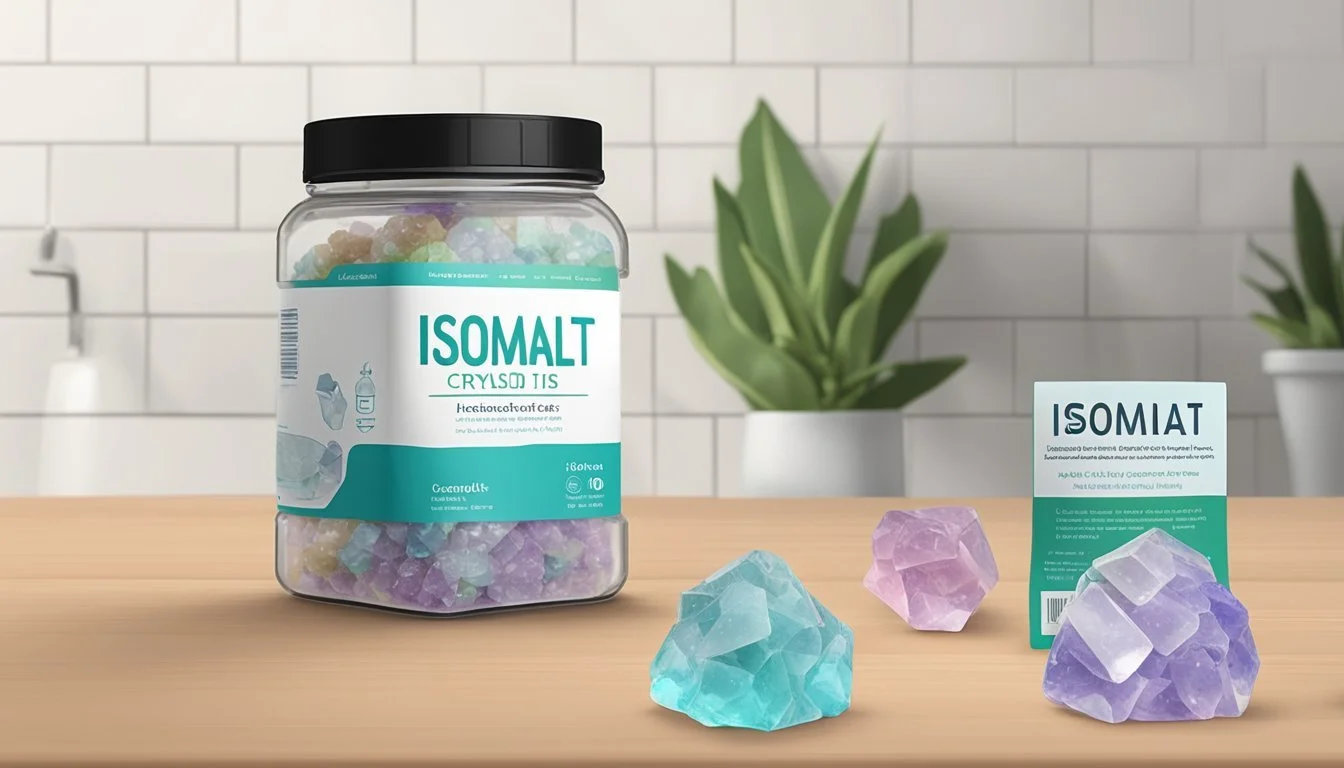Is Isomalt Vegan?
Understanding This Sugar Substitute's Origins
Isomalt is a sugar substitute that has gained popularity, especially among those following a vegan diet. As a plant-derived ingredient, it caters to the dietary requirements of vegans who avoid animal byproducts. Isomalt's composition does not involve any ingredients derived from animals, which fortifies its status as vegan-friendly. Its chemical structure, primarily consisting of two disaccharide alcohols, allows it to mimic the taste and texture of sugar while providing fewer calories.
Unlike traditional sugars, isomalt has a minimal impact on blood sugar levels, making it a preferred sweetener for individuals who are monitoring their glucose intake or managing diabetes. The characteristics of isomalt extend beyond nutrition; it is also non-cariogenic, meaning it does not contribute to tooth decay, which adds another benefit to its use over regular sugar.
In the realm of food production, isomalt is commonly utilized in making sugar-free candies, chocolates, and various baked goods. Its ability to provide a sweet flavor without the added calories or adverse health effects associated with sugar consumption has made isomalt a valuable asset in the food industry, especially for consumers prioritizing health-conscious alternatives.
What Is Isomalt?
Isomalt is a sugar substitute widely recognized for its vegan-friendly profile and low-caloric content. It stands out for its low impact on blood sugar levels and its stability under high temperatures.
Chemical Composition and Properties
Isomalt is a sugar alcohol, a type of carbohydrate that mimics the sweetness of sugar with fewer calories. It is primarily composed of two isomers, 6-O-α-D-glucopyranosyl-D-sorbitol and 1-O-α-D-glucopyranosyl-D-mannitol. These compounds are responsible for its sugar-like taste and texture. Its physical properties include:
White, crystalline appearance
Odorless
Resistant to moisture
Maintains sweetness when heated
Comparison With Other Sugar Alcohols
When compared to other sugar alcohols such as xylitol and erythritol, isomalt is notable for its:
Similar taste and texture to sugar
Lower glycemic index, minimizing impact on blood sugar levels
Higher thermal stability, which makes it suitable for high-temperature culinary processes
Health Aspects of Isomalt
As a sugar alcohol, isomalt provides a caloric content of 2 kcal/g, which is significantly less than that of regular sugar. Its benefits include:
Lower calorie count: Contributes to weight management
Low glycemic index: Makes it a safe option for individuals monitoring their blood sugar
Does not promote tooth decay
Recognized as safe for consumption by health authorities
Vegans may consider it a suitable sugar alternative due to its plant-based origin.
Understanding Veganism
Veganism is a comprehensive lifestyle choice that extends beyond diet, encompassing a philosophy that seeks to exclude the exploitation of and cruelty to animals to the greatest extent possible.
Basic Principles of a Vegan Diet
A vegan diet consists solely of plant-based foods, eliminating all animal products. It supports the fundamental ethos of veganism, reinforcing the commitment to minimize harm to animals in all consumption practices. The staples of a vegan diet often include:
Fruits and Vegetables: A wide variety of fresh, frozen, or canned options.
Legumes: Beans, lentils, and peas provide essential proteins.
Nuts and Seeds: Sources of healthy fats and vitamins.
Whole Grains: Such as rice, oats, and barley offer fiber and nutrients.
Plant-Based Milks and Cheeses: Often fortified with vitamins like B12.
Identifying Non-Vegan Ingredients
Vegan-friendly products avoid animal-derived ingredients. Identifying non-vegan ingredients is crucial for maintaining a vegan diet. Key indicators include:
Animal-Derived Ingredients:
Meat, poultry, fish, and insects
Dairy products (milk, cheese, yogurt)
Eggs and egg products
Honey and other bee products
Gelatin (often derived from animal bones and connective tissue)
It is important for individuals following a vegan diet to read product labels carefully. Certification by a recognized vegan organization can assist in quickly identifying vegan-friendly products. When uncertain, one can seek resources that explain the origin of less obvious ingredients.
Isomalt in a Vegan Diet
Isomalt is a sugar substitute that piques the interest of those following a vegan diet due to its plant-based composition. This section examines its origins, any potential animal derivatives, and vegan alternatives.
Origin of Isomalt
Isomalt is derived from sucrose, which is primarily sourced from sugar beets. The production of isomalt involves enzymatic conversion, ensuring that the final product remains free of animal derivatives. Sugar beets, utilized in isomalt production, are a plant-based ingredient, making the base composition of isomalt suitable for vegans.
Isomalt and Animal Derivatives
Isomalt itself does not contain any animal derivatives. Unlike traditional sugar refining, which sometimes involves the use of bone char for decolorization, isomalt's manufacturing process is entirely animal-free. Its chemical structure is similar to sucrose, but it is modified to prevent the body from fully absorbing it, resulting in a lower-calorie sweetener that aligns with vegan ethics.
Alternatives to Isomalt for Vegans
Vegans seeking substitutes for isomalt in their diet have several plant-based options:
Stevia: A zero-calorie sweetener derived from the leaves of the stevia plant.
Erythritol: A sugar alcohol with low calories, sourced from fermented plant sugars.
Monk fruit sweetener: Extracted from the monk fruit, which provides a sweet taste without added calories.
Xylitol: Another plant-based sugar alcohol often sourced from birch trees or corn.
These alternatives provide versatility for those on a vegan diet looking for a range of sweetening options without compromising their dietary principles.
Uses of Isomalt in Food
Utilized for its sugar-like taste and versatile properties, Isomalt serves as a crucial ingredient in various food products, particularly where sugar reduction is desired.
Isomalt in Confectionery
Isomalt is widely employed in the confectionery industry due to its ability to provide a sweet flavor similar to sugar while being low in calories. It is especially prevalent in the production of sugar-free candies, including hard candies and lollipops, where it helps in creating clear, shiny, and attractive pieces. Due to its resistance to moisture, isomalt is also preferred for chewing gum and cough drops, as it minimizes stickiness and elongates shelf life.
Benefits in Baked Goods
In baked goods, Isomalt contributes to a satisfying texture and stabilizes humidity, which can be particularly beneficial in items like cookies, cakes, and pastries that are intended to be sugar-free. Its gluten-free attribute makes it suitable for those with dietary restrictions, while its ability to withstand high temperatures without browning enables baked products to maintain their intended color and flavor profile.
Specialty Applications
Isomalt boasts a range of specialty applications. Renowned for its clarity and stability, it is a favored choice for edible decorations and sugar sculptures, allowing cake decorators to craft intricate and transparent designs. Sugar-free chocolates also frequently include isomalt, not just for sweetness, but for its retention of a desired creamy texture. As it does not react significantly to dyes, Isomalt is used to create vibrant, colorful sweet treats that are both flavorful and visually appealing.
Health Considerations for Isomalt Consumption
In evaluating isomalt as a sugar substitute, consumers should consider various health aspects, including its impact on blood sugar control, dental health, and potential for causing digestive issues.
Glycemic Index and Diabetes Management
Isomalt touts a lower glycemic index (GI) than regular sugar, making it a more favorable choice for individuals managing diabetes. Its lower GI means it has a less significant impact on blood glucose levels. However, individuals with diabetes should still monitor their overall consumption and consult with healthcare providers to ensure it aligns with their dietary needs.
Dental Health Benefits
Tooth decay is a common concern for sweetener consumption. Isomalt is considered tooth-friendly, as it is non-cariogenic, meaning it does not contribute to tooth decay. Its resistance to metabolism by oral bacteria makes it less likely to cause dental issues compared to traditional sugars.
Potential Side Effects and Intolerances
While isomalt has benefits, one must also be aware of its potential side effects:
Digestive issues: Overconsumption may lead to digestive discomfort due to its osmotic effect, drawing water into the intestine and acting as a laxative.
Intolerances: Some individuals may experience intolerance to sugar alcohols like isomalt, presenting symptoms such as bloating or gas with excessive intake.
Individuals considering isomalt should start with small amounts to gauge their tolerance and avoid gastrointestinal upset.
Navigating Food Labels and Ingredients Lists
When purchasing food products, it is crucial for vegans to examine labels and ingredients lists carefully. This ensures that additives like isomalt and other sweeteners align with vegan standards.
Identifying Isomalt on Product Packaging
Consumers can locate isomalt on product packaging by carefully reviewing the ingredients list. Isomalt may be listed under various names such as E953, reflecting its food additive code. In addition to isomalt, products can contain different sweeteners, some of which are natural like stevia, agave syrup, and maple syrup, or they may include sugar alcohols such as sorbitol, erythritol, and xylitol. For a clear understanding, they should look for labels stating that the product is vegan-certified, as this indicates it meets established vegan guidelines.
Understanding Food Additives and Sweeteners
Food additives and sweeteners are commonly used in the food industry to enhance taste, texture, and preservation. Vegan consumers should recognize that while many sweeteners like isomalt, derived from beet sugar, are plant-based, they must be wary of others. Artificial sweeteners sometimes have animal-derived ingredients or are tested on animals. Reading food labels thoroughly allows consumers to distinguish between vegan and non-vegan products and make informed choices based on reliable labeling.
Isomalt in Baking and Cooking
When utilizing isomalt in baking and cooking, one must consider its unique properties and how they affect traditional recipes. Isomalt offers a sugar-free alternative while keeping a sweet flavor profile and structural integrity under high heat, making it ideal for certain culinary applications.
Recipe Adaptations for Isomalt
Isomalt can replace sugar in a 1:1 substitution ratio in recipes, although the sweetness level of isomalt is less intense, which may require adjustments according to taste. When baking with isomalt, it should be noted that, unlike sugar, isomalt does not caramelize or brown, so the visual cues bakers rely on might differ. Isomalt works well in:
Sugar-free candies: It maintains a stable structure and does not crystallize easily, providing a smooth texture.
Dessert decorations: Isomalt can be molded and shaped at high temperatures, perfect for artistic pieces that require clarity.
Baked goods: Low-hygroscopic nature means it absorbs less moisture, which can benefit the shelf life and texture of baked products.
Technical Considerations and Equipment
Working with isomalt requires precise temperature control; thus, a candy thermometer is crucial for monitoring. Isomalt needs to be heated to about 160-170°C (320-338°F) before it reaches the appropriate state for most candy-making applications. During heating, it is essential not to overheat isomalt as it can degrade, leading to a bitter taste.
For high-heat processes like candy making, cooks should ensure their kitchen is well-ventilated and take precautions to avoid burns, as melted isomalt can be extremely hot. When isomalt is incorporated into recipes, it typically does not retain moisture as sugar does, which can influence the end product's texture and consistency.
Overall, adopting isomalt into one's culinary repertoire presents an appealing alternative for sugar-free or reduced-calorie diets, provided the individual adopts the correct techniques and considers the specific qualities of this versatile ingredient.
Dietary Lifestyles and Sugar Substitutes
Choosing the right sugar substitute can be pivotal in adhering to specific dietary lifestyles like keto and paleo. Isomalt, as a sugar alcohol, offers a low-calorie alternative suitable for some diets.
Isomalt in Keto and Paleo Diets
Keto Diet:
Isomalt's low glycemic index and minimal impact on blood sugar levels align with the keto diet's requirements for low-carb and sugar-free ingredients. However, due to it being a processed food, it may not be the first choice for those keto adherents focusing on whole, unprocessed foods.
Isomalt and Keto
Low-carb: ✓
Sugar-free: ✓
Processed: ✓ (Consideration required)
Paleo Diet:
On the paleo diet, the focus is on unprocessed, natural foods, which often excludes artificial sweeteners. While isomalt is derived from beet sugar, its highly processed nature typically places it outside the paleo dietary parameters.
Isomalt and Paleo
Natural source: ✓
Highly processed: ✗ (May not be suitable)
Finding the Right Balance
For individuals considering isomalt in their diet, it's important to understand not only their own dietary guidelines but also their personal health goals. While isomalt can offer benefits like a reduction in calorie intake and being sugar-free, balancing these benefits with the need for whole, minimally processed foods is crucial.
Considerations for Dietary Balance:
Health goals (weight, blood sugar control, etc.)
Dietary restrictions (keto, paleo, vegan)
Level of food processing acceptance
In conclusion, it's essential for each person to weigh isomalt's attributes against their dietary principles and health objectives to make an informed decision on its use.










